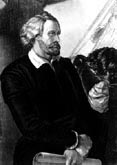Everyone help me give a warm welcome to our last guest here. For this last person, we have brought in Pope Leo IX. Leo, today we are going to be talking about the East-West Schism. Could you start us off by telling us how this began?
L: Well, there is no one particular date of when the church began to split, as it happened over periods of time, but I will try to explain what happened in the beginning. In a sense, it started around 1054. A representative of mine excommunicated the Constantinople Patriarch, who then excommunicated me. This is how the Eastern Orthodox Church began to break away from Catholicism. Before I go into explaining all of that in detail though, let me explain how church power is split up. There are 5 Patriarchs, and Christians fell under the power of the Patriarch of the area. The 5 patriarchs controlled Antioch, Alexandria, Jerusalem, Constantinople, and Rome. The two most powerful is the Constantinople Patriarch, and the Roman Patriarch, or the Pope.
Go on.
L: Well, later on, the other three Patriarchs fell to Muslim rule, and the pope had to rely on the Franks for protection. This left just 2 powers, with no one to act as a mediator. When I tried to work with the Byzantine Emperor to stave off the Normans, I was to be given control of an area that was already under the control of the Constantinople Patriarch Michael Cerularius. He told the people there to not listen to me. I responded by having him excommunicated. This is what led to the Orthodox Church. It also resulted in the Byzantine Empire falling to the Ottoman Empire without my help.
Well, that wraps up our interviews. I hope you have learned something.





















